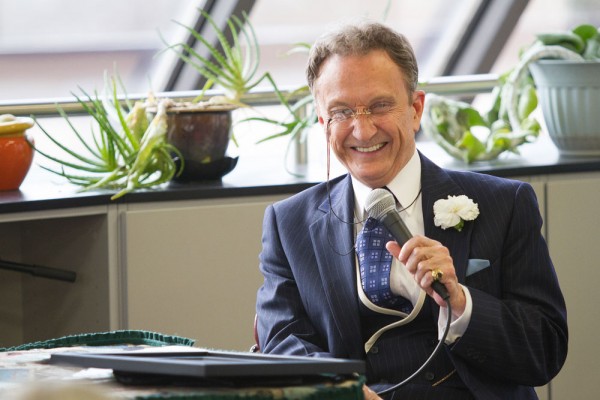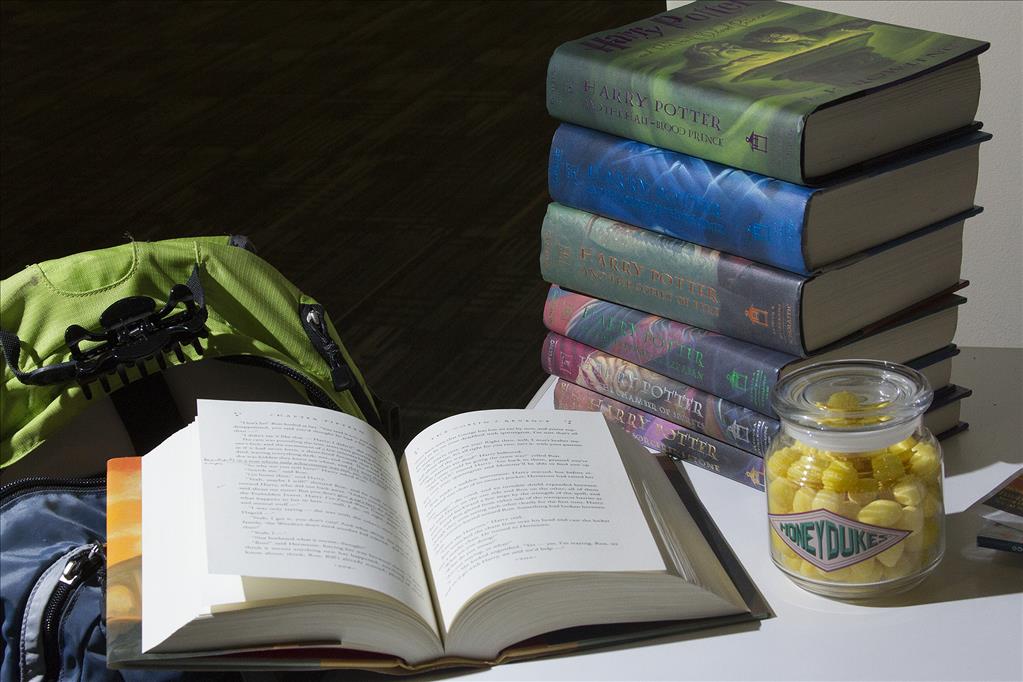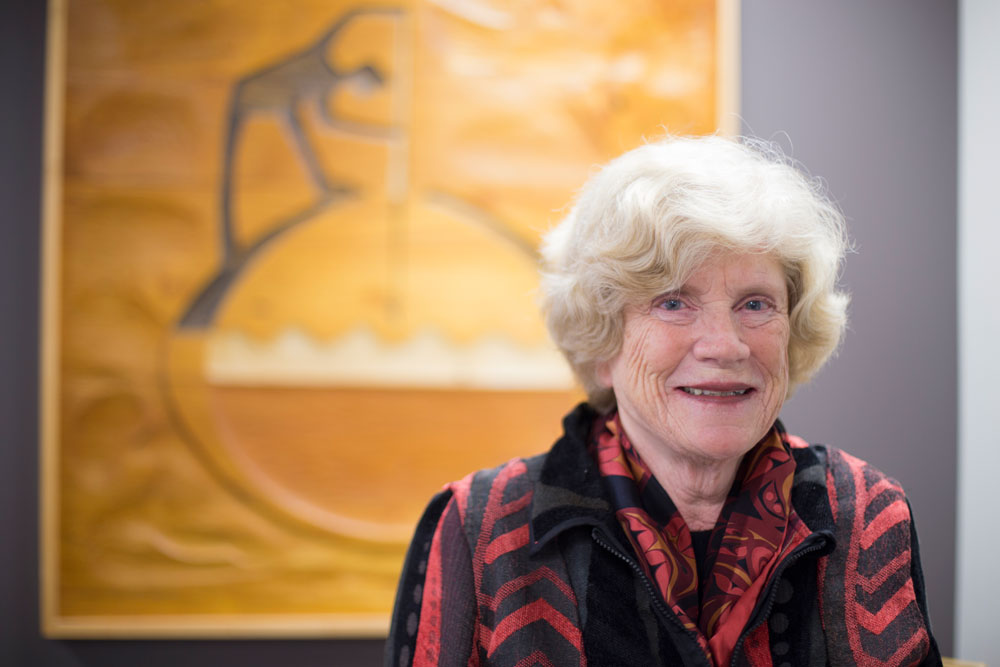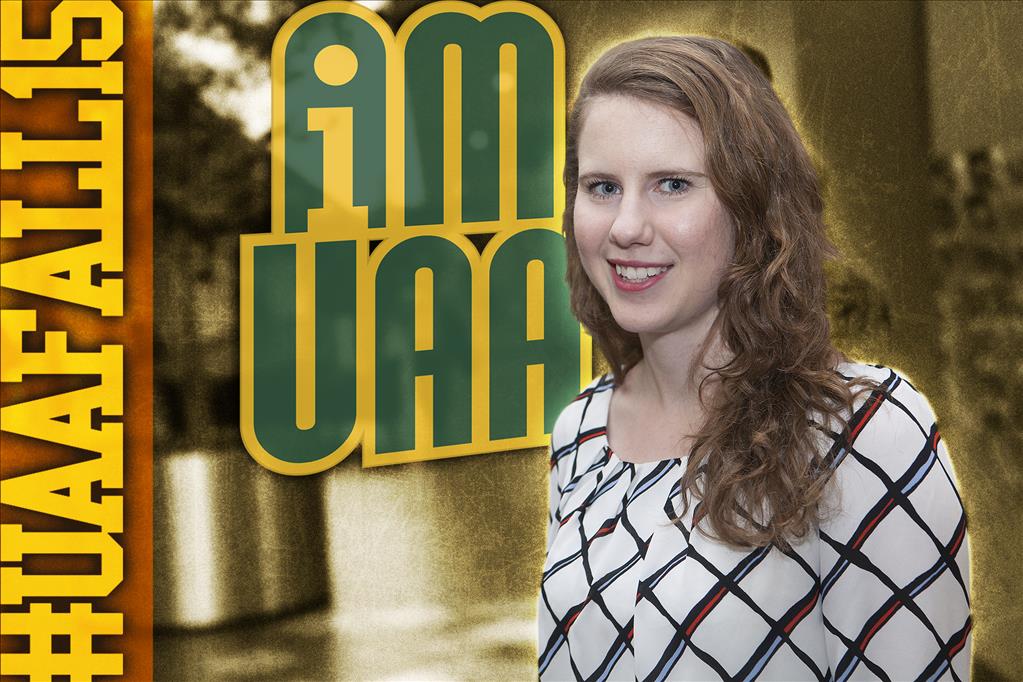Long live the Romantics: Saluting Clay Nunnally for 45 years of teaching excellence
by Kathleen McCoy |

Clay Nunnally at the UAA Campus Bookstore, where students paid tribute to him with a Q-and-A session on April 24, 2015. (Photo by Philip Hall/University of Alaska Anchorage)
On May 3, UAA saluted 1,353 college graduates with wafting strains of "Pomp and Circumstance" and green and gold confetti showering from the ceiling of the Alaska Airlines Center.
On this same day, the campus community bade a fond farewell to a singular force in teaching, professor Clay Nunnally. He's retiring after 45 years of luring English undergraduates toward the aesthetics and gentle sensibilities of 18th century Victorian and Romantic-era poetry and prose.
Even if you never took a Nunnally class, he was hard to miss. Dapper and formal, almost always wearing a suit, vest and tie, dress shoes and fancy pocket square. He routinely went the extra fashion mile with a fresh carnation boutonnière and period pince-nez spectacles. He could startle a self-absorbed walking-and-texting co-ed with his Southern-twinged, "Good morning, my dear!"
Despite protestations over any fuss at his departure, his students' sense of the appropriate prevailed. On a recent Friday, they staged a formal Q-and-A with Nunnally as their subject. It happened in the sunny upstairs campus bookstore before an audience packed with English majors, alumni from across the decades, and his faculty colleagues from the Department of English.
Before the students began, emcee Toby Widdicombe presented Nunnally with the premier slot on a new, perpetual award for teaching excellence, aptly named the Clay Nunnally Teaching Award.

Nunnally's student inquisitors were, l-r, Christopher Richardson, Patty Pierce and Vincent Gregory. (Photo by Philip Hall/University of Alaska Anchorage)
Dressed formally in deep blue, the professor sat alongside the interviewers' table (two even mimicking his white boutonnière) as they traded opportunities to ask their departing professor whatever they wanted to know.
An early query puzzled over his formality. "After you retire, Professor Nunnally, whatever are you going to do with all those suits?"
Before he could speak, Linda, his wife sitting in the front row, muttered in a stage whisper, "Bury them!" That sent everyone into peals of laughter, until Nunnally recovered enough to say he thought his wife really meant to bronze one as a keepsake.
Another panelist asked his favorite piece of 18th century music for his daily, before-5 a.m. commute from Girdwood. He still lives there in the 1,700-square-foot cabin he and friends built when he first came north more than four decades ago.
His study retreat is on the second level, and he never bothered to furnish much of the rest until he married about 20 years ago. He recalls those "pre-oil Alaska" days fondly, including chopping and bucking his own firewood, with only about 100 Girdwood neighbors total.
Nunnally said driving a dangerous road every day requires music with "gentle monotony," so anything by Vivaldi, Mozart or Haydn will do. But for pure rapture, he said, almost gravely, "I prefer the Romantics, Tchaikovsky. My favorite pianist is Vladimir Horowitz. I am fortunate enough to have his playing of Tchaikovsky's first piano concerto under the direction of Toscanini. I consider it one of the grand works of nature."
Another student noted Nunnally's penchant for reciting poetry from memory, and asked him to do so on the spot. The professor easily complied, offering a measured "The Song of Wandering Aengus" by Yeats.
"I went out to the hazel wood, Because a fire was in my head...."
"It's such a gentle poem," Ninnally said at the end. "Quite frankly, I really don't want to find out what it means."
Another question: If he could live the life of one Romantic-period writer, who would it be and why?
That one was easy. "I'd like to say Lord Byron," he quipped amid laughter, citing the British poet notorious for sexual and financial excesses, "but I simply don't have the energy!"
No, Nunnally chose a quieter soul to emulate, the minor writer and critic, Charles Lamb. Much like Bob Cratchit, Lamb labored long days at a tedious clerking job so that he could support a mentally ill sister. Along the way, he evolved into a scholarly critic and, as one biographer noted, "the most touching character in English literature."
"The thing I like the most about him," Nunnally said, "is that he appreciated the simple joys of home, of family life, of quiet, gentle living in which you run your roots down very, very deep. And whatever is at hand, you enjoy to the fullest."
If that was not enough of a life lesson, his students-who repeatedly referred to him as "a statesman" and "a Southern gentleman"-asked for his single best piece of advice. His quick smile had a touch of mischief: "I think I would go back to Sancho Panza and Don Quixote: 'But patience, cousin, and shuffle the cards.'"

Nunnally declined to roll out on the skateboard; "I have a shred of dignity left," he said. "I think I'll hang on to it." (Photo by Philip Hall/University of Alaska Anchorage)
His audience enjoyed that, too, but his students pressed for what they really wanted. Nunnally, 75, once told a reporter for The Northern Light campus newspaper, "...when they have to wheel me in on a skateboard, I'll know it's time to quit." His fans expected to watch him roll out on their gift, a hand-painted skateboard covered with white carnations and signed by his students.
Nunnally laughed long and hard when he saw it, but no way would he oblige. "I have a shred of dignity left," he said. "I think I'll hang on to it."
Later in his windowless office and flanked by Civil War portraits of Robert E. Lee and "Stonewall" Jackson," this Mississippi-born academic explained his life-long passion for the Romantics.
"My natural inclination is for older literature, a more gentle, kinder literature," he said. "Victorian, Romantic, it speaks to me much more than the stress and strains of modern realism. I really don't care to fathom through many people's histories, the angst and all that. I just rather go back and read a poem about nature. So that is how it is."
He said he brought some deep South with him when he came North, but once here, he always knew Alaska was his home.
"I look back," he said, "and it was all such a marvelous gift."
A version of this story by Kathleen McCoy appeared Sunday, May 3, 2015 in Alaska Dispatch News.
 "Long live the Romantics: Saluting Clay Nunnally for 45 years of teaching excellence" is licensed under a Creative Commons Attribution-NonCommercial 4.0 International License.
"Long live the Romantics: Saluting Clay Nunnally for 45 years of teaching excellence" is licensed under a Creative Commons Attribution-NonCommercial 4.0 International License.















